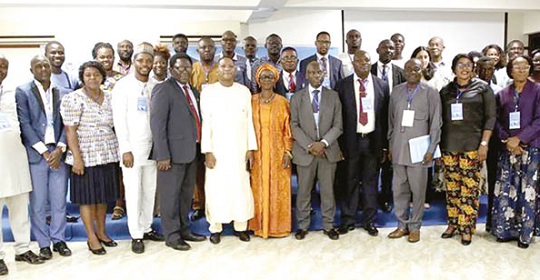
Redefine curricula to reflect current trends - Prof. Oyewole charges African varsities
Universities must redefine their curricula for teaching and learning to ensure that graduates come out with the requisite skills and competencies required on the job market, the Secretary-General of the Association of African Universities (AAU), Professor Olusola Oyewole, has said.
According to him, such a curricula should also be able to respond to the emerging needs of the African continent.
“Many countries are still using curricula handed over by the colonial past; no wonder our graduates come out from various institutions and claim they are unemployable and need to be retrained to be relevant to the needs of industry. This should not continue,” Professor he said.
Conference
Prof. Oyewole was addressing delegates at a three-day World Conference on Education and Restitution which began in Accra last Tuesday.
The three-day conference is on the theme: “The past, the present, and the future: Afrofuturism and Africa’s development”.
The virtual and in-person conference is being participated by over 2,000 people from 90 countries.
Among topics being discussed are rethinking education excellence in Africa, the role of the youth in the promotion of pan-Africanism, empowering African youth to top artificial intelligence (AI) knowledge and education, winning back the education Africa lost and the future of jobs for African graduates in the digital age.
He called for the building of a resilient African educational system that would stand the test of time and respond proactively to emerging diseases such as COVID-19 and Monkey pox.
Prof. Oyewole said one of the strategies the continent could employ was the promotion of excellence in higher education, adding that the people could also use language, songs and music “to solve Africa’s problems”.
Commitment
The Head of Office and UNESCO Representative to Ghana, Abdourahamane Diallo, said the wealth of knowledge and skills transmitted through “intangible cultural heritage from one generation to the next is central to the re-imagination of an Afrocentric version of the future and UNESCO was committed to safeguarding it”.
Living heritage, he said, included oral traditions, performing arts, rituals, social practices, festive events and traditional craftsmanship.
“Here in Ghana, we have many living expressions, such as highlife music, Adinkra and Ga symbols, the traditional mastery of shea butter in the north, traditional herbal medicine and earthenware pottery-making -- the list is inexhaustible,” he added.
The Executive Chairman of the Pan-African Heritage World Museum, Kojo Yankah, in a speech read on his behalf, emphasised the significance of the collaboration among major stakeholders, such as the AAU and UNESCO.
“So we have an obligation to reclaim the kind of education that tells the truth about our origins, our rich cultural heritage and our people’s achievements and expectations,” he said.
Significance
The Chairman of the planning committee of the conference, Pash Obeng, said it was intended to allow people to tell their own stories in their own voices.
He said the conference had been “curated around the vision of how Africans and Afro-descendants could claim and reclaim ways of shaping who they have been, are and will be on their own terms”.
The Secretary-General of the Ghana Commission for UNESCO, Ama Serwah Nerquaye-Tetteh, also said the commission was committed to the improvement and development of the educational and heritage sectors of the country.
A representative of the Francophone University Agency, Laurent ILboudo, commended organisers of the conference, saying it constituted a dynamic cooperation to build a resilient, strong and harmonised educational system in Africa
